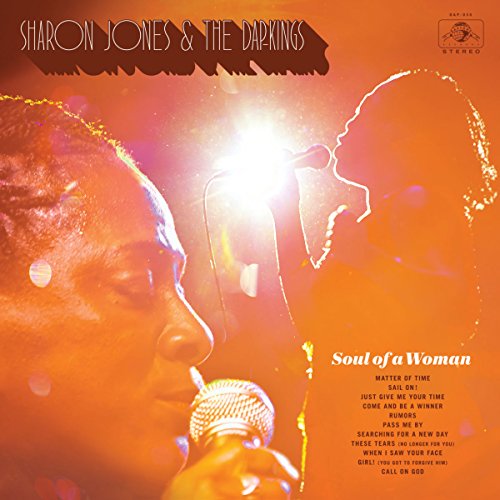
Sharon Jones & the Dap-Kings
Soul of a Woman
Release Date: Nov 17, 2017
Genre(s): R&B
Record label: Daptone
Music Critic Score
How the Music Critic Score works
Buy Soul of a Woman from Amazon
Album Review: Soul of a Woman by Sharon Jones & the Dap-Kings
Excellent, Based on 10 Critics
Based on rating 9/10
The most heartbreaking aspect of this final, posthumously released studio record by Sharon Jones and her integral partners in the Dap-Kings is that she, despite ailing with cancer, sounds like she's at peak power. This record reflects Jones' final sessions before she passed away on November 16, 2016, and is a purposefully dynamic exhibition of her eclectic modes in the Dap-Kings. Soul of a Woman highlights the whole outfit's power as the baddest live band on the planet while leaving enough space for their more introspective, orchestral ….
Based on rating 4.5/5
It's no fluke that the concept of "time" plays a part in Sharon Jones' final studio album. After all, she knew there wasn't much of it left while recording these 11 songs with her long time Dap-Kings backing band. The pancreatic cancer the singer had been battling for years, a fight documented in the film Miss Sharon Jones!, finally caught up with her on December 18, 2016, but not before she laid down most of the material for this, her last release.
Based on rating 8.7/10
Though Soul Of A Woman was never intended to be a posthumous release for the mighty Sharon Jones, it stands as both a fitting epilogue for an unlikely career and a comprehensive farewell to a multifaceted star--one that burned unbelievably bright. Courageously recorded with her beloved Dap-Kings between treatments for the pancreatic cancer she succumbed to last year, Soul Of A Woman offers up a piece of everything that made Jones a powerhouse up to the very end. Like all the soul greats, Jones grew up singing gospel in church, her natural talent enough to earn her extra money as a wedding singer, but not enough to surmount the adversity from the closed-minded industry.
Based on rating 4/5
I t is tempting to overpraise the recently departed. But the late - and, arguably, great - Sharon Jones was not discovered via a TV talent show or hothoused at a fame school. Her voice clawed its way out of obscurity through sheer force of will. Before she had a late-life recording career, Jones sang in church and worked in jobs that risked life and limb - as an armoured van guard and as a prison officer at the notorious Rikers Island.
Based on rating 8/10
Sharon Jones was 45 years old when she cut her first single with the retro-soul combo the Dap-Kings in 2001. She'd been trying to find a way into the music business for years before her partnership with the Dap-Kings unexpectedly made her a star, but it was obvious that once the right people heard her, they knew she one of the great R&B singers of her generation. Once the door opened for her, she didn't look back for a second.
Based on rating 4/5
When Sharon Jones died of pancreatic cancer last year, the world lost its greatest exponent of vintage soul; that she'd first hit her stride in the '00s with the revivalist, detail-obsessed Daptone label, made the accomplishment all the more striking. Recorded over her last two years with longtime sidemen, genre-masters all, Jones meets darkness with hope on this denouement. "A Matter of Time" envisions world peace; "Come and Be a Winner" is a funky pep talk.
Based on rating 4/5
Sharon Jones was arguably the greatest US soul singer of the last 25 years. Her death at the age of 60 last November robbed the world of one of the very few 21st century performers who evoked the sound and spirit of the golden age of soul. And it's not just that she recorded onto tape using vintage analogue equipment; her authenticity came from deep within.
Based on rating 4.0/5
Perhaps the most striking thing about Sharon Jones & the Dap-Kings's eighth and (presumably) final album, Soul of a Woman, is how little it feels like a posthumous release. The straightforward gospel of closing track “Call on God” undeniably gains some poignancy from the fact that Sharon Jones sang it with knowledge of her impending death, but the album is dominated by a sense of joy and hopefulness. Rather than grimly foreshadowing her fate with her last recordings, Jones stuck to the music that gave her life: timeless meditations on R&B's core themes of love, loss, and romantic strife, delivered atop the Dap-Kings's trademark, note-perfect reconstruction of 1960s soul.
Based on rating B
After Sharon Jones' memorial service in Brooklyn last December, the musicians who’d gathered to remember her got right back to the work. Gathered at the Daptone House of Soul, these collaborators (which included Bosco Mann and The Dap-Kings, as well as members of E.L. Fields’ Gospel Wonders, the gospel choir of Jones’ Universal Church of God) returned to one song in particular: “Call on God”, an uplifting gospel hymn Jones wrote four decades earlier as a young member of that same choir.
Opinion: Excellent
Coming across Sharon Jones a dozen or so years ago was a revelation. Jones and her intensely tight backing band the Dap-Kings came straight out of 1960s soul and funk; it was a time machine. Almost. Because at the same time, there was something new and vibrant about the recordings, due as much to Jones's personality as to her remarkable vocal skills.
'Soul of a Woman'
is available now

